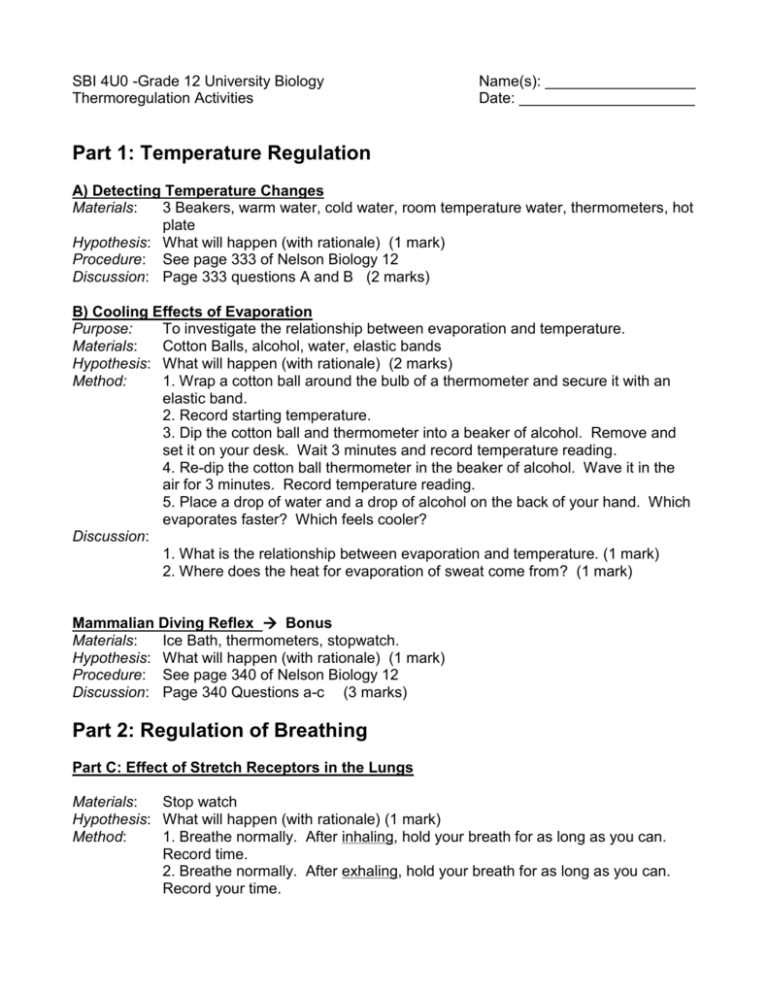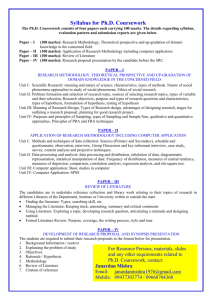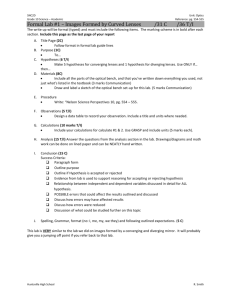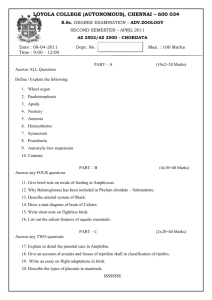SBI 4U0 -Grade 12 University Biology
advertisement

SBI 4U0 -Grade 12 University Biology Thermoregulation Activities Name(s): __________________ Date: _____________________ Part 1: Temperature Regulation A) Detecting Temperature Changes Materials: 3 Beakers, warm water, cold water, room temperature water, thermometers, hot plate Hypothesis: What will happen (with rationale) (1 mark) Procedure: See page 333 of Nelson Biology 12 Discussion: Page 333 questions A and B (2 marks) B) Cooling Effects of Evaporation Purpose: To investigate the relationship between evaporation and temperature. Materials: Cotton Balls, alcohol, water, elastic bands Hypothesis: What will happen (with rationale) (2 marks) Method: 1. Wrap a cotton ball around the bulb of a thermometer and secure it with an elastic band. 2. Record starting temperature. 3. Dip the cotton ball and thermometer into a beaker of alcohol. Remove and set it on your desk. Wait 3 minutes and record temperature reading. 4. Re-dip the cotton ball thermometer in the beaker of alcohol. Wave it in the air for 3 minutes. Record temperature reading. 5. Place a drop of water and a drop of alcohol on the back of your hand. Which evaporates faster? Which feels cooler? Discussion: 1. What is the relationship between evaporation and temperature. (1 mark) 2. Where does the heat for evaporation of sweat come from? (1 mark) Mammalian Diving Reflex Bonus Materials: Ice Bath, thermometers, stopwatch. Hypothesis: What will happen (with rationale) (1 mark) Procedure: See page 340 of Nelson Biology 12 Discussion: Page 340 Questions a-c (3 marks) Part 2: Regulation of Breathing Part C: Effect of Stretch Receptors in the Lungs Materials: Stop watch Hypothesis: What will happen (with rationale) (1 mark) Method: 1. Breathe normally. After inhaling, hold your breath for as long as you can. Record time. 2. Breathe normally. After exhaling, hold your breath for as long as you can. Record your time. Part D: Effects of Carbon dioxide Materials: Stop watch, paper bag, stairs Hypothesis: What will happen (with rationale) (1 mark) Method: 1. Hyperventilate 20 times then inhale and hold your breath. Time and record your results in a data table. 2. Hyperventilate 20 times into a paper bag, then inhale and hold your breath. Time and record your results in a data table. 3.Exercise vigorously (step-ups, push-ups, jumping jacks) for 5 minutes. Inhale, hold your breath. Time and record your results in a data table. Discussion for Part C and D: 1. Describe and explain the differences in results obtained in each part of Part D. (2 marks) 2. Describe and explain the differences in the results obtained in Part E. (2 marks) 3. Describe and explain why the results in the first part of Part D are different from the results in the first part of Part E. (2 marks) 4. How might these responses help an Otter (Mammal) or Loon (Bird) dive underwater to catch fish? (1 mark) Marks: Part One: Results tables for parts B & B Appropriate information in table Hypotheses Questions 0 0 0 0 1 1 1 1 2 2 2 2 3 4 Possible Bonus Marks for Mammalian Diving Reflex: Results table (1), Information (1), Hypothesis (1) Questions (3) Part Two: Results tables for parts D & E Appropriate information in table Hypotheses Questions 0 0 0 0 TOTAL /24 1 1 1 1 2 2 2 2 3 3 4 5 6 7








